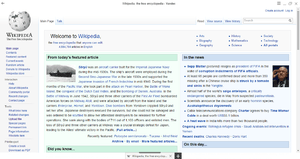Yandex Browser
 | |
|
Yandex Browser on Windows 10. | |
| Developer(s) | Yandex |
|---|---|
| Initial release | 1 October 2012 |
| Stable release |
17.4.1.919
/ 28 May 2017 |
| Preview release |
17.3.2.362
/ 21 April 2017 |
| Development status | Active |
| Written in | C++, JavaScript |
| Operating system | |
| Engine | Blink |
| Platform | ARM, IA-32, x86-64 |
| Size | 60 880 KB |
| Available in | 6 languages |
|
List of languages Belarusian, English, Kazakh, Russian, Turkish, Ukrainian | |
| Type | Web browser |
| License | Freeware[1] |
| Website |
browser |
Yandex Browser is a freeware web browser[1] developed by the Russian web search corporation Yandex that uses the Blink web browser engine and is based on the Chromium open source project.[2] The browser checks webpage security with the Yandex security system and checks downloaded files with Kaspersky anti-virus.[2][3] The browser also uses Opera Software's Turbo technology to speed web browsing on slow connections.[4]
The browser is available for Windows, macOS, Android and iOS. In October 2014 a Linux beta version was introduced.[5]
Yandex is facing web search competition in Russia from Google Search.[6] Google Chrome, Russia's most popular web browser, uses Google Search as its default search engine. In June 2012, Mozilla Firefox, the world's third most popular web browser, signed a deal to replace its default search engine Yandex Search with Google Search.[6] As Yandex browser's "Smartbox" uses Yandex Search as its default search engine, the browser will help Yandex compete for Russian search market share.[7]
Distinguishing features
Distinguishing features of the Yandex.Browser include the following:
- User data sync with the Internet and other devices running yandex.browser, including tabs, bookmarks, history, passwords, settings, and more. Unlike Chrome and Chromium, Yandex user account (not Google's) is used for this.[8]
- Integrated translation: selecting any text shows a popup button which, when pressed, shows a translation of the text to Russian using Lingvo.[9]
- Supports extensions for Google Chrome and Opera.[10]
- With version 1.1 Opera Turbo has been integrated to speed the loading of web pages over slow internet connections and reduce data use.[11]
- Ad blocking pornographic advertising.[12]
- Infinite Personally Targeted Recommended Content using Yandex Zen-based artificial intelligence to target content for users.[13]
- Different "new tab" screen with a Windows 8-style interface and specialized widgets for popular services (e.g., the gmail widget shows number of unread messages).[14]
- Integrated keyboard layout switcher in omnibox: e.g., if a user often uses gmail.com and starts typing "пьф" ("gma" with Russian keyboard layout) and presses Enter, the user will then be taken to gmail.com and not to the search page for "пьф" (as is the case in Chrome, for example).[14]
- Warning of possibility of external monitoring of internet traffic.[15]
Security
DNS spoofing protection
Protect active security technology scans files and website for viruses, blocks fraudulent webpages, protects passwords and bank card details, and keeps online payments safe from theft.[16][17]
DNSCrypt
The world's first browser with support for DNSCrypt technology.[18] Encrypts Domain Name System (DNS) traffic. For example, it protects from a trojan DNSChanger, a tracking Internet provider, or hackers. This option must be enabled in the browser settings.[17]
Protecting Wi-Fi
When connecting to open Wi-Fi networks or to the points that use a weak WEP-defense, Yandex Browser automatically encrypts traffic between it and the HTTP sites.[19]
Market share
According to Liveinternet.ru analytics, Yandex Browser reached 2.3% market share in Russia two months after its release.[20] As of November 2016, Yandex Browser for computers reached 19.1%[21] and 4.9%[22] on mobile devices in Russia.
References
- 1 2 ""Yandex" Browser Software License Agreement". Yandex. Retrieved 2012-10-02.
- 1 2 Lunden, Ingrid (1 October 2012). "Yandex Gives Google A One-Two Punch In Russia: A New Browser And App Store For The Local Search Giant". TechCrunch. AOL Inc. Retrieved 8 October 2012.
- ↑ "Reliable protection from viruses". Yandex. Retrieved 2012-10-02.
- ↑ "Yandex launches its own browser targeting Russian market". Engadget. Retrieved 2012-10-02.
- ↑ Sneddon, Joey (31 October 2014). "Russia's 'Yandex Browser' Launches First Linux Beta, Is No Chrome Clone". OMG! Ubuntu!. Ohso Ltd. Retrieved 21 April 2017.
- 1 2 "New Yandex browser escalates Russia's search-engine wars". Net Prophet. Retrieved 2012-10-16.
- ↑ "Yandex Starts Own Internet Browser to Challenge Google". Bloomberg Businessweek. Retrieved 2012-10-02.
- ↑ "Yandex, Browser syncing". Retrieved 13 May 2017.
- ↑ "yandex Browser Translating pages, sentences, and words". Retrieved 11 May 2017.
- ↑ "Yandex support, If the browser disables an extension that you developed". Retrieved 13 May 2017.
- ↑ "Yandex.Browser 1.1 Press Release". Yandex.Company.
- ↑ "Protect: Антишок – Браузер (классический интерфейс) – Яндекс.Помощь". yandex.ru. Retrieved December 28, 2016.
- ↑ "Yandex – Company blog – Yandex Unveils First Browser with Infinite Personally Targeted Recommended Content". yandex.com. Retrieved December 28, 2016.
- 1 2 Sørensen, Sven. "Yandex.Browser Review". Retrieved 13 May 2017.
- ↑ https://browser.yandex.ru/blog/pervyy-brauzer-preduprezhdayuschiy-o-proslushke-trafika
- ↑ "Protect: безопасность в интернете – Браузер (классический интерфейс) – Яндекс.Помощь". yandex.ru. Retrieved December 28, 2016.
- 1 2 "Yandex – Company blog – Yandex Browser Pioneers Built-in DNS Security". yandex.com. Retrieved December 28, 2016.
- ↑ "Темы – Блог Яндекс.Браузера". yandex.ru. Retrieved December 28, 2016.
- ↑ "Protect: защита соединений Wi-Fi – Браузер (классический интерфейс) – Яндекс.Помощь". yandex.ru. Retrieved December 28, 2016.
- ↑ "Liveinternet.ru analytics".
- ↑ "site statistics "Сайты Рунета"". www.liveinternet.ru. Retrieved 2016-12-01.
- ↑ "site statistics "Сайты Рунета"". www.liveinternet.ru. Retrieved 2016-12-01.
